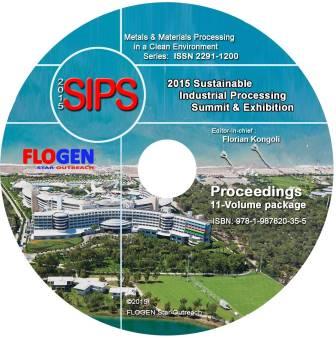2015-Sustainable Industrial Processing Summit
SIPS 2015 Volume 1: Aifantis Intl. Symp. / Multiscale Material Mechanics
| Editors: | Kongoli F, Bordas S, Estrin Y |
| Publisher: | Flogen Star OUTREACH |
| Publication date: | 23 December 2015 |
| Pages: | 300 pages |
| ISBN: | 978-1-987820-24-9 |
| ISSN: | 2291-1227 (Metals and Materials Processing in a Clean Environment Series) |

< CD shopping page
Structural Model of Mechanical Twinning and its Application for Modeling of Plate Collisions Problem and Dynamical Taylor Anvil on Rod Tests
Elijah Borodin1; Alexander Mayer1;1CHELYABINSK STATE UNIVERSITY, Chelyabinsk, Russian Federation;
Type of Paper: Regular
Id Paper: 494
Topic: 1
Abstract:
We propose a new structural model of the mechanical twinning applicable for description of severe plastic deformation in 1D and 2D formulation. The model includes the equations of kinetics and dynamics of twins based on the energetic and structural data about the process of twinning. The growth of twins is considered as a process of collective slipping of the twinning dislocations. The model of twinning is a complement to the dislocation plasticity model and requires only one additional parameter, which is the stacking fault energy characterizing the material tendency for twinning. The twinning model together with the dislocation plasticity model is applied to model the structure of the shock wave front in thin metal foils, the distribution of dislocations and twins over the cross section of shock-loaded metal specimens at plate impact and dynamical axis-symmetric Taylor tests.
For the plate collision problem, it was found that the volume fraction of twins in vicinities of the loaded surface and a spall crack is, in order of magnitude, higher than that at the center of the target. The features of twins arising in different parts of the target are discussed.
The application of models to describe the plastic deformation in the dynamical Taylor anvil on rod tests leads to interesting results, which have a quantitative and qualitative correspondence with the experimental data about the form of the compacted samples. Calculations led us to reveal contributions of the dislocation plasticity and twinning on different stages of the deformation process and to explain the observed complex ("mushrooming") shape of the deformed copper rods at high impact velocities.
This study was supported by grants of the President of the Russian Federation (MD-286.2014.1), and the Ministry of Education and Science of the Russian Federation (competitive part of State Task of NIR CSU No. 3.1334.2014/K).